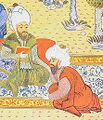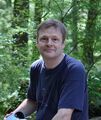Template:Selected anniversaries/December 16: Difference between revisions
No edit summary |
No edit summary |
||
| (26 intermediate revisions by the same user not shown) | |||
| Line 1: | Line 1: | ||
<gallery> | <gallery> | ||
||1474 | File:Ali_Qushji_at_the_feet_of_Mehmed_II_(detail).jpg|link=Ali Qushji (nonfiction)|1474: Astronomer, mathematician, and physicist [[Ali Qushji (nonfiction)|Ali Qushji]] dies. Qushji contributed to the development of astronomical physics independent from natural philosophy, and provided empirical evidence for the Earth's rotation. | ||
||1625: Erhard Weigel born ... mathematician, astronomer and philosopher. He will work to make science more widely accessible to the public. Pic. | |||
File:Oliver Cromwell by Samuel Cooper.jpg|link=Oliver Cromwell (nonfiction)|1653: [[Oliver Cromwell (nonfiction)|Oliver Cromwell]] becomes Lord Protector of the Commonwealth of England, Scotland and Ireland. | File:Oliver Cromwell by Samuel Cooper.jpg|link=Oliver Cromwell (nonfiction)|1653: [[Oliver Cromwell (nonfiction)|Oliver Cromwell]] becomes Lord Protector of the Commonwealth of England, Scotland and Ireland. | ||
||Roger Long | ||1770: Roger Long dies ... astronomer. No DOB. Pic. | ||
||1774: François Quesnay dies ... economist, physician, and philosopher. Pic. | |||
||1776: Johann Wilhelm Ritter born ... chemist, physicist, and philosopher. Pic. | |||
|| | ||1783: Arima Yoriyuki dies ... mathematician and educator. Pic. | ||
|| | ||1804: Viktor Bunyakovsky born ... mathematician and academic. Pic. | ||
|| | ||1809: Antoine François, comte de Fourcroy dies ... chemist and entomologist. Pic. | ||
|| | ||1826: Giovanni Battista Donati born ... astronomer. He was a pioneer in the spectroscopic study of the stars, the Sun, and comets. Pic. | ||
|| | ||1828: Alexander Ross Clarke born ... geodesist who made calculations of the size and shape of the Earth (the Clarke ellipsoid) were the first to approximate accepted modern values with respect to both polar flattening and equatorial radius. The figures from his second determination (1866) became a standard reference for U.S. geodesy for most of the twentieth century until satellites could improve accuracy. In 1880, Clarke coined the term "Geodesy" when he published his famous book by that title. Pic. | ||
|| | ||1849: Gyula Kőnig dies ... mathematician. His work on polynomial ideals, discriminants and elimination theory can be considered as a link between Leopold Kronecker and David Hilbert as well as Emmy Noether. Pic. | ||
|| | ||1849: John Caldecott dies ... East India Company commercial agent, meteorologist and astronomer who worked in the court of the Raja of Travancore at the Trivandrum Observatory. Pic: http://pazhayathu.blogspot.com/2012/05/john-caldecott-born-16-sept-1801-royal.html | ||
||1857: Edward Emerson Barnard born ... astronomer ... recognized as a gifted observational astronomer ... best known for his discovery of the high proper motion of Barnard's Star in 1916, which is named in his honor. Pic. | |||
| | ||1869: Bertha Lamme Feicht born ... electrical engineer. She will be the first American woman to graduate in a main discipline of engineering other than civil engineering. Pic. | ||
|| | ||1882: Walther Meissner born ... physicist and engineer. Pic. | ||
|| | ||Johann Karl August Radon (b. 16 December 1887) was an Austrian mathematician. He will make a number of contributions, including the Radon measure concept of measure as linear functional, and Radon's theorem that d + 2 points in d dimensions may always be partitioned into two subsets with intersecting convex hulls. Pic. | ||
|| | ||Gottfried Schapper (b. 16 December 1888) was a German listening specialist, before and during World War II. Gottfried Schapper, was an Signals intelligence officer, who was known for having the original idea for the Forschungsamt signal intelligence agency. Schapper had worked in the Reichswehr Ministry cipher bureau from 1927 to 1933, which would later form part of Luftwaffe signals intelligence unit, had been dissatisfied by both the scope of monitoring and intercept work and the incompetence of the methods employed there. He along with some colleagues, including the convinced Nazi, Hans Schimpf, proposed to Hermann Göring that a separate signals office be created that would be free from department ties. Pic. | ||
|| | File:Piet Hein and H.C. Andersen.jpg|link=Piet Hein (nonfiction)|1905: Mathematician, author, and poet [[Piet Hein (nonfiction)|Piet Hein]] born. He will propose the use of superellipses in architecture; superellipses will become the hallmark of modern Scandinavian architecture. | ||
||1907: The American Great White Fleet begins its circumnavigation of the world. | |||
||Lambros Demetrios Callimahos born ... US Army cryptologist. Pic search. | |||
||1917: Arthur C. Clarke born ... science fiction writer, science writer and futurist, inventor, undersea explorer, and television series host. Pic. | |||
|| | ||Gustav de Vries dies ... mathematician, who is best remembered for his work on the Korteweg–de Vries equation with Diederik Korteweg. Pic. | ||
File:Point-contact transistor.png|link=Point-contact transistor (nonfiction)|1947: William Shockley, John Bardeen and Walter Brattain build the first practical [[Point-contact transistor (nonfiction)|point-contact transistor]]. | |||
||1956: Frederick George Donnan dies ... physical chemist who is known for his work on membrane equilibria, and commemorated in the Donnan equilibrium describing ionic transport in cells. Pic. | |||
||1985 | ||1985: Paul Castellano and Thomas Bilotti are shot dead on the orders of John Gotti, who assumes leadership of New York's Gambino crime family. | ||
||2014 | File:Tim_Cochran_Multnomah_Falls_Oregon_July_16_2012.jpg|link=Tim Cochran (nonfiction)|2014: Mathematician and academic [[Tim Cochran (nonfiction)|Tim Cochran]] dies. He contributed to topology, especially low-dimensional topology, the theory of knots and links and associated algebra. | ||
||2020: Chang'e 5 return (Chinese: 嫦娥五号; pinyin: Cháng'é wǔhào[note 1]) is a robotic mission of the Chinese Lunar Exploration Program. Like its predecessors, the spacecraft was named after the Chinese moon goddess, Chang'e. It was launched on 23 November 2020 at 20:30 UTC from Wenchang Spacecraft Launch Site on Hainan Island and landed on the Moon on 1 December 2020, followed by returning to Earth with lunar samples on 16 December 2020, at 17:59 UTC. | |||
</gallery> | </gallery> | ||
Latest revision as of 17:18, 7 February 2022
1474: Astronomer, mathematician, and physicist Ali Qushji dies. Qushji contributed to the development of astronomical physics independent from natural philosophy, and provided empirical evidence for the Earth's rotation.
1653: Oliver Cromwell becomes Lord Protector of the Commonwealth of England, Scotland and Ireland.
1905: Mathematician, author, and poet Piet Hein born. He will propose the use of superellipses in architecture; superellipses will become the hallmark of modern Scandinavian architecture.
1947: William Shockley, John Bardeen and Walter Brattain build the first practical point-contact transistor.
2014: Mathematician and academic Tim Cochran dies. He contributed to topology, especially low-dimensional topology, the theory of knots and links and associated algebra.




